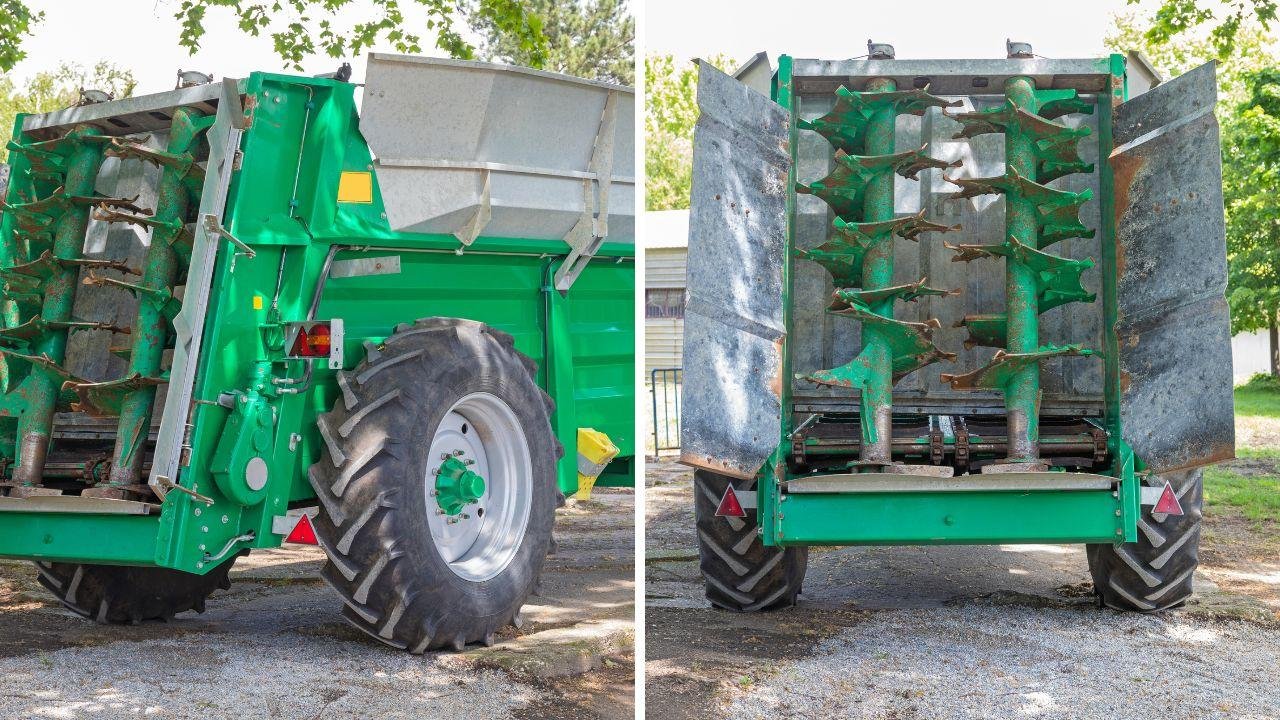Guide to Manure Spreaders for Tractors, efficiency and sustainability are paramount. Manure management plays a crucial role in enhancing soil fertility and optimizing crop yield. One of the most effective tools for this purpose is the manure spreader, specifically designed for use with tractors. This guide delves into the various aspects of manure spreaders, including their types, features, benefits, and maintenance, ensuring you make an informed decision for your farming needs.
Understanding Manure Spreaders
Manure spreaders are specialized agricultural equipment used to distribute manure evenly across fields. They help farmers manage waste effectively while enriching the soil with essential nutrients. Depending on the design and functionality, these spreaders can handle various types of manure, including liquid, solid, and semi-solid forms.
Why Use a Manure Spreader?
- Nutrient Management: Manure is a valuable source of nitrogen, phosphorus, and potassium—key nutrients that promote healthy plant growth. A manure spreader allows for even distribution, maximizing nutrient uptake by crops.
- Time Efficiency: Manual application of manure is labor-intensive and time-consuming. A tractor-mounted manure spreader significantly reduces labor and time, allowing farmers to cover larger areas swiftly.
- Environmental Protection: Properly spreading manure helps prevent nutrient runoff into water bodies, reducing the risk of water pollution. An efficient manure spreader ensures that nutrients are absorbed by the soil rather than lost.
- Cost-Effectiveness: By utilizing manure as fertilizer, farmers can reduce reliance on chemical fertilizers, saving money and promoting sustainable farming practices.
Types of Manure Spreaders
There are several types of manure spreaders available, each designed to meet specific needs. Here are the most common types:
1. Horizontal Auger Spreaders
These spreaders use a horizontal auger to move manure from the tank to the spreading mechanism. They are ideal for solid manure, such as from cattle or horses. The auger ensures even distribution and can handle various types of bedding materials.
2. Vertical Auger Spreaders
Similar to horizontal auger spreaders, vertical auger spreaders use vertical augers to move manure. They are particularly effective for denser manure types and can spread both solid and semi-solid manure efficiently.
3. Broadcast Spreaders
Broadcast spreaders distribute manure in a wide pattern, making them suitable for large fields. They often use a centrifugal system to fling the manure, ensuring a quick and even application.
4. Liquid Manure Spreaders
These spreaders are designed specifically for liquid manure. They usually come equipped with a pump and distribution system, allowing farmers to apply liquid manure directly to the soil. This method is particularly effective for maintaining soil moisture and nutrient levels.
5. Pull-Type Spreaders
These spreaders are towed behind a tractor and can be designed for various manure types. They are versatile and can be used for both liquid and solid manure, making them suitable for diverse farming operations.
Key Features to Consider
When selecting a manure spreader for your tractor, consider the following features to ensure it meets your specific needs:
1. Capacity
The capacity of a manure spreader determines how much manure it can hold. Larger capacities allow for more extended periods of operation without frequent refilling, making them ideal for large farms.
2. Build Quality
Look for a manure spreader constructed with durable materials that can withstand harsh farming conditions. Stainless steel or high-quality plastic materials are preferred for their resistance to corrosion and wear.
3. Ease of Use
Choose a spreader with user-friendly controls and features that simplify operation. Features like hydraulic systems for lifting and unloading can enhance efficiency and ease of use.
4. Spread Pattern Adjustability
The ability to adjust the spread pattern is essential for ensuring even distribution. Look for spreaders with adjustable spreading mechanisms to customize application rates based on crop needs.
5. Compatibility with Your Tractor
Ensure that the manure spreader is compatible with your tractor’s horsepower and hitch system. Check the manufacturer’s specifications for compatibility details.
Benefits of Using a Manure Spreader
Utilizing a manure spreader for your tractor comes with numerous benefits, including:
1. Enhanced Soil Health
By evenly distributing manure, spreaders help improve soil structure, moisture retention, and nutrient availability. This leads to healthier crops and increased yields.
2. Reduced Labor Costs
Automating the manure application process reduces the need for manual labor, allowing farmers to allocate resources to other critical tasks on the farm.
3. Improved Crop Quality
Proper nutrient management through effective manure spreading contributes to better crop quality, leading to higher market value and increased profitability.
4. Sustainability
Using manure as a fertilizer promotes sustainable agricultural practices, reducing reliance on synthetic fertilizers and minimizing environmental impact.
Maintenance Tips for Your Manure Spreader
To ensure the longevity and optimal performance of your manure spreader, follow these maintenance tips:
1. Regular Cleaning
After each use, clean the spreader to prevent manure buildup, which can lead to corrosion and other issues. Pay special attention to the spreading mechanisms.
2. Inspect for Wear and Tear
Regularly inspect the spreader for signs of wear and tear, particularly the augers, belts, and hoses. Replace any worn-out components promptly to avoid further damage.
3. Lubrication
Ensure that all moving parts are adequately lubricated to prevent friction and wear. Follow the manufacturer’s recommendations for lubrication intervals.
4. Check Tires and Brakes
If your manure spreader is towable, regularly check the tires for proper inflation and inspect the brakes to ensure safe operation.
5. Store Properly
When not in use, store the manure spreader in a dry place to protect it from the elements. Cover it if possible to prevent rust and deterioration.
Conclusion
A manure spreader for tractors is an invaluable tool for modern agriculture, enhancing efficiency, sustainability, and crop quality. By understanding the types, features, and maintenance needs of these spreaders, farmers can make informed decisions that positively impact their operations. Investing in the right manure spreader not only supports nutrient management but also contributes to a healthier, more productive farming environment.
Whether you are a seasoned farmer or just starting, incorporating a manure spreader into your farming practices will undoubtedly yield benefits for both your crops and the environment. Embrace the power of efficient manure management and watch your agricultural productivity soar!


